by OLIVER WAKE
Television career overview
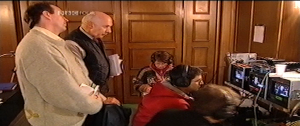
This piece was revised and updated in 2014 and 2015.
Ian Curteis is an fascinating figure in the world of British television drama. He achieved great success in the 1970s as a writer of plays exploring real events and historical figures but thereafter found his work sometimes frustrated, with cancelled projects and related controversies. Accounts differ as to whether these frustrations were the result of political censorship or the more mundane reasons common in broadcasting. This essay presents an overview of Curteis’s television career, incorporating material from a variety of contrasting sources, including Curteis himself, which illustrates why his work is so interesting and, sometimes, divisive.
Iain Bayley Curteis was born in 1935. He was initially an actor, having joined Joan Littlewood’s Theatre Workshop in the mid-1950s. He later acted in, directed and produced plays at a variety of theatres across the UK. His earliest involvement in the world of television was as a script reader for the BBC, and possibly for Granada also, work he took on to supplement his theatre income.1 In 1964, he joined the BBC as a trainee drama director for six months.2 Towards the end of 1964, after this trainee period expired, he directed episodes of Z Cars (1962-78) and an instalment of anthology series Kipling (1964) for the Corporation.3 The following year he directed John Betjeman and Stewart Farrar’s satirical television play Pity About the Abbey and took freelance work with ITV, directing episodes of Front Page Story (1965).4 Although made for and initially shown on BBC2, Pity About the Abbey was later ‘promoted’ to a BBC1 repeat transmission as part of the channel’s premiere drama slot, The Wednesday Play (1964-70), which indicates something of its success.5
The well-regarded Pity About the Abbey led to Curteis being invited to direct the science fiction feature film The Projected Man in 1966. It was a difficult production with one of the producers later claiming that Curteis had been unable to stick to the shooting schedule, resulting in his replacement for the final days of filming.6 Curteis counters that the low-budget film had been given an “impossible” shooting schedule and he only left the project when money to pay him ran out.7 In the same genre he directed Walk’s End for the BBC’s Out of the Unknown (1965-71) anthology series and it too was a fraught production with one sequence not recorded within the studio time available.8 Producer Irene Shubik blamed Curteis, calling him “a hopeless director … [who] didn’t know how to cope with the studio.”9 However, Curteis reports that the problems stemmed from the studio sets having been built to dimensions different from those specified, on which the camera script and rehearsals had been based.10 Gerald Savory, the BBC’s Head of Plays, supported Shubik and the play was ultimately completed without Curteis.11
Curteis didn’t direct for the BBC subsequently, and only directed episodes of the ITV children’s serial The New Forest Rustlers (1966) before making writing his full-time occupation.12 This, it seems, was no different from what he had always intended, as he explains: “Since the age of 14 I knew my life would be as a playwright; directing had been a diversion which was prolonged as it was necessary to support a young family and pay a mortgage.”13 His earliest writing credits were 1968’s The Folly for the Love Story (1963-74) anthology and The Haunting for the Saturday Night Theatre strand (1969-71), both made by ATV.14 The latter concerned a man haunted by memories of his marriage and dead wife that may be more illusion than reality.
Over 1966-68 Curteis had written, under commission from the BBC, a trilogy of teleplays under the collective title Long Voyage Out of War (1971), which went into production in 1970.15 Curteis believed that: “For ages, there have been plays without a proper ending, no third act, if you like”.16 His trilogy was an attempt at combating this. He suggested the reason for the recent dearth of plays with “a proper ending” was “because nobody, writers included, could see how to work things out – religion, ethics, all the rest – against the hopeless background of the Bomb, the Cold War, Cuba, Vietnam. Now I think there is hope. We have learnt something from coming so close to destruction.”17 His trilogy therefore followed a path from the destruction of the old social order in the darkest days of the Second World War, through the spectre of nuclear devastation and a search for new values in ideological conflict, and out into a new and quietly optimistic future.
The trilogy opens with The Gentle Invasion, set in Kent’s Romney Marsh in 1940.18 A German bomb breaches the sea defences, flooding the village. A group of locals bicker and fight while they shelter in the ruined church, fearing invasion. To the characters the world seems to be ending around them but it is the destruction from within their society – the young against the old, and the immigrant against the native – that is the basis of the drama. The second play, Battle for Tematangi, is set in the Philippines in 1954.19 Turk Godfray, who had appeared in the first play but not as its lead, has joined a band of mercenaries fighting in a local revolution. Some fight for money, others for a better world. The band is routed and flees by boat, passing symbolically through the fallout of the first H-bomb test at Bikini.
The Last Enemy concludes the trilogy in the Britain of 1976.20 Turk leads a charity finding homes for orphaned refugee children. He takes a young African girl into his own family and struggles with her autism. Curteis himself had experience of cross-race adoption, having adopted a West Indian boy into his white family in 1968. In an afterword to the published script, Curteis suggests a religious impulse underlined the trilogy, drawing parallels with the Old Testament story of the flood and the ark.21 He also suggests it represents the death of God as “a separate authority” and his rebirth in the actions of man, although this point is not obvious from the text itself.22 Sadly the plays are now lost but the scripts suggest that the trilogy was an impressive achievement, with the middle instalment being particularly effective.
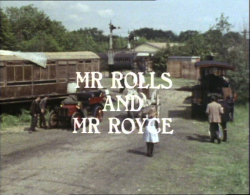
Curteis’s talent for biographical drama emerged with Beethoven and Alexander Fleming (both 1970) for the BBC’s Biography (1970) series.23 Curteis followed these with Mr Rolls and Mr Royce (1972), about which The Times wrote: “The basis of Ian Curteis’s script was clearly researched in minute detail but on this occasion the documentary accuracy became almost a drawback; it kept catching round the ankles of the dialogue and tripping it up.”24
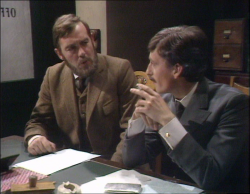
This drawback is the occupational hazard for drama documentary writers, who are damned if they do and damned if they don’t stick closely to the facts. Curteis has often insisted that he doesn’t write what he calls ‘dramatised-documentaries’, only plays. He points out that a dramatised documentary merely attempts to dispassionately reproduce real events in a dramatic fashion, whereas in a play based on history, a playwright can more fully explore character and a chosen theme, perhaps building an argument in favour of a certain view.25 It’s an important distinction, but not one which broadcasters or television audiences have always recognised or acknowledged.
In the 1970s Curteis contributed scripts to a variety of established television series, including Doomwatch (BBC, 1970-72), Crown Court (ITV, 1972-84), Sutherland’s Law (BBC, 1973-76), The Onedin Line (BBC, 1971-80), Hadleigh (ITV, 1969-76) and Barlow (BBC, 1971-75). Curteis recalls that this work on series was “mostly great fun” but was undertaken for the practical purposes of supporting his family financially, as had his earlier directing.26 He would gain greater satisfaction from his original plays. In 1976 he wrote the documentary drama The Portland Millions for Granada’s Victorian Scandals (1976) and the following year devised the legal series Rough Justice for the BBC.27 A further historical subject was Prince Regent, about the life of George IV, which he devised for the BBC in 1979.
Philby, Burgess and Maclean (1977) was the first of a run of substantial dramas by Curteis dealing with 20th century events.28 As the title suggests, the play was about the ‘Cambridge spies’ who worked in high government positions during the 1940s and ‘50s before their discovery and defection to the USSR. Although it could be regarded as a documentary-drama, given its basis in fact, Curteis wrote it as a parable on the theme of loyalty and an exploration of the argument that loyalty could most deeply be owed to somewhere other than one’s country.29 It was a highly polished production which became Granada’s entry for the 1978 Monte Carlo Festival and was a BAFTA Best Play nominee. It was subsequently broadcast in 48 counties, with an estimated audience in excess of 100 million.30
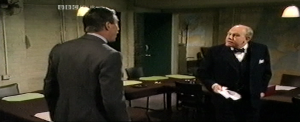
Produced by Scottish TV, Hess (1978) recreated Nazi deputy Fuhrer Rudolf Hess’s landing in Scotland in 1941 in an unlikely attempt to negotiate peace between Britain and Germany.31 It was a topical drama, with calls being made earlier that year to release Hess from prison. In a similar vein to Philby, Burgess and Maclean, The Atom Spies (1979) dramatised the case of the German physicist Klaus Fuchs, who had passed atomic research secrets to the USSR during the 1940s.32 Curteis’s BBC drama Churchill and the Generals (1979) depicted Winston Churchill’s often stormy relationship with his top military commanders during the Second World War.33 It was another nominee for the Best Play of the Year BAFTA award and later won the Grand Prize at the New York International Film and TV Festival.
Suez 1956 (1979) followed, again for the BBC.34 The play depicted the political machinations of prime minister Anthony Eden and his cabinet during the crisis over the Egyptian nationalisation of the Suez canal in 1956. It had been written five years earlier but had been postponed as “too expensive and too controversial” to be produced then, according to director Michael Darlow, who anticipated it causing upset.35 Curteis asserted that he had written not a dramatic reconstruction of history, but a play, containing a mix of “detective work, speculation, personal assessment and authenticated fact.”36 Indeed, he intended it not to be an impartial, objective account of the events in question, but a “defence of Eden’s position over the Suez crisis, a case which is rarely heard.”37 This conception may have been partially obscured in production, with Curteis noting that it was directed “in a far more dramatised-documentary fashion than I intended.”38
In 1980 Curteis planned a biographical drama about Oswald Mosley, founder and leader of the British Union of Fascists. The project was abandoned following the Home Office’s refusal to release documentation to Curteis.39 Given comments we’ll cover later, it seems likely Curteis’s play would have attempted to rehabilitate Mosley’s reputation to some degree. The same year he was involved in a bid for an ITV licence as a director of Television South-East when regional broadcasting contracts came up for renewal.
Curteis’s ITV drama Miss Morison’s Ghosts (1981) was loosely based on an eerie experience reported by two Oxford academics on a visit to Versailles in 1901.40 It was regarded highly enough to be submitted into 1982’s Monte Carlo International Television Festival. Around the same time Curteis wrote Private Affairs, a play inspired by the 1931 scandal of the Liberal Party leader Lord Beauchamp, which was seen on stage in 1982.
In 1983 Curteis was commissioned by the BBC’s Director General to write a documentary play in the mould of Suez 1956 dealing with the political and diplomatic processes of the previous year’s Falklands war. Curteis explains:
I proposed it to Alistair Milne, the DG, in his other Role as Editor-in-chief of the BBC and legally responsible for balance. The BBC produced three highly expensive plays opposing our stance in defending the Falkland Islands or pouring scorn on it. As the episode was the most revealing convulsion of our nation’s psyche since Suez, I proposed my play as a counter-balance, putting the case for the defence.
As I worked on it, however, I started to see a different emphasis and came to think of it as a celebration of our national hard-won values, hard-forged over the decades, the generations and sometimes the centuries, as they were manifested yet again, this time in the defence of the Falkland Islands when they were invaded by a fascist, military dictatorship of a particularly ugly sort with an appalling human rights record, who would very soon have destroyed democracy and freedom of speech on the Islands as they already had in their own country.41
After Curteis experienced resistance during his initial research, The Falklands Play, as the project came to be known, was postponed and rescheduled for broadcast in 1987, the fifth anniversary of the conflict. However, at a late stage in 1986, the BBC suddenly deferred its production.
The play showed Prime Minister Margaret Thatcher in a positive light and Curteis suggested the postponement (or cancellation as it in effect became) was because the BBC didn’t wish to broadcast such a portrayal due to its left-wing bias. He alleged that Peter Goodchild, the BBC’s Head of Plays, had instructed him to revise his script to show Thatcher less sympathetically and to depict the cabinet making military decisions with an eye on the government’s prospects at the next general election. He reported he had refused to make these changes, pointing out that there was no documentary evidence to prove that the latter ever occurred.42 Curteis and Goodchild had clashed previously, most notably when Goodchild had cancelled production of his 1920s globe-trotting trilogy BB and Joe with, Curteis claimed, a rationale of “breathtaking inadequacy”.43
The BBC denied Curteis’s allegations and countered that it would be irresponsible for them to produce The Falklands Play in the run-up to the looming general election, and maintained that it was only postponed until after the election, pending script approval.44 Michael Grade, the BBC’s Director of Programmes, put forward the argument that the production hadn’t proceeded because of the poor quality of the script.45 Anglia Television expressed an interest in producing the play and made contact with Grade who, Curteis reported, refused to release the BBC’s remaining copyright on the play.46 The play was not rescheduled after the 1987 general election.
“I am sad beyond words that a great institution like the BBC should be reduced to cancelling meticulously researched historical plays because they do not coincide with the political views of the television establishment. There can be no other explanation for their decision”, Curteis said.47 He went on to state that, “In my opinion all BBC drama is now heavily biased against the Establishment and particularly against this government”.48 Curteis’s allegations were seized upon by opponents of the BBC and the debate about the BBC’s alleged anti-Establishment left-wing bias ran and ran. The publication of the script the following year revealed that, perhaps surprisingly in view of his reported rejection of the idea, Curteis had included a scene in which Thatcher looked to the next general election after all.
After his involvement in a debate at the Edinburgh International Television Festival in 1987 was reported as a repeat of “his now well known attack on left-wing drama”, Curteis responded that it was actually “a plea for a richer democracy in drama, including left-wing drama. It was a plea I’ve been arguing in public for eight years at least”.49 Regardless, he had already been reported the previous year as describing himself as representing the “centre-right” of politics and the right-wing label stuck.50 His conservative views subsequently made him a handy participant for media debates, with his comments sought on his Christian beliefs and antipathy towards strong language on television. In 2002 he stated: “I find the right-wing tag rather tiresome … I think I’m actually a traditionalist. To be patriotic is not to be right-wing.”51
By the time of the Falklands Play fiasco, Curteis had notched up a number of unrealised projects, though this is nothing unusual for a professional writer. These included film and television dramas about, amongst others, Stalin, the 18th century political revolutionary Tom Paine, and spy George Blake, about whom he later wrote a radio play.52 Immediately before the Falklands Play debacle Curteis had, he reported, been discussing with Alasdair Milne potential dramas about the 1938 Munich crisis, to tie in with its 50th anniversary, and about the life of Cecil Rhodes, but these came to nothing.53
Curteis returned to the BBC in 1995 with a new drama documentary project as ill-fated as his last. This play was to have dramatised the Yalta conference of 1945, at which Churchill, Roosevelt and Stalin planned the post-war reorganisation of Europe. When the project was cancelled, the Falklands Play controversy replayed itself in miniature, with Curteis complaining that the BBC had axed the drama on political grounds, due to his right-wing presentation of events.54 The BBC denied this, stating that the required co-production funding could not be raised in time for the conference’s 50th anniversary, for which the play was to be timed.55 Curteis counters that the co-production finance had already been secured and it was the BBC who were unable to afford their share.56
“The BBC is in unofficial opposition to the government”, Curteis said, “You never see any programmes on the BBC arguing the case for hunting, for instance, or capital punishment, or suggesting that Oswald Mosley was not a villain but a mistaken man.”57 Calling him “the whingeing playwright”, The Guardian queried why the BBC would have paid Curteis (reportedly £55,000) to write the Yalta play if they had so objected to his politics, and pointed out that the Corporation had recently cancelled numerous dramas due to a large budget deficit.58 He was still working on a version of the Yalta play in 2002, revealing in interview that it would include a defence of the highly-controversial Allied bombing of Dresden, which would no doubt have attracted much media comment if had reached television.59 His radio play dealing with the conference and the role of the spy Donald Maclean was heard in early 2014.60
1995 did, however, see one Curteis project reach transmission on the BBC: an adaptation of his wife Joanna Trollope’s novel The Choir.61 Between the Falklands Play debacle and this point, Curteis had written a lengthy adaptation of J.B. Priestley’s Lost Empires (1987) for ITV, the opening of the mammoth Mission Eureka (1991), a co-production between Channel 4 and various European broadcasters, and dramatised William Shirer’s The Nightmare Years (1991), about Germany in 1934-41, for America’s HBO.62 Thereafter there is no indication that he wrote anything further for television, though he has mentioned that he was once in talks about a possible Gulf war drama that came to nothing.63 Curteis reported in 2002 having been asked to write something about “the Afghan war”, but this also has not materialised.64
The Falklands Play was finally produced by the BBC simultaneously for television and radio to mark the 20th anniversary of the conflict in 2002, following Curteis’s suggestion to the BBC’s then Director General Greg Dyke.65 It was a streamlined script, reduced by half to 90 minutes. All the sequences depicting Argentine political processes were lost, as was a lot of early material of the US diplomatic team. As such, the play concentrated on the British side of the war, albeit with room to depict the UN and American attempts at intervention. The scene of Thatcher suggesting that a lack of action over the crisis may see the government lose the next election remained, as in the published script.
Curteis continues to write, primarily for the theatre and radio, whiles also managing the upkeep of the remote 14th century North Yorkshire country house in which he lives.66 Although we have concentrated here on his television work, it had never been his aspiration to work in the medium. He notes: “Anyone who wishes to grasp what my professional life has been, and continues to be, about, should be aware that my foundations are theatre, not the electronic world. That is one reason why I have always practiced my belief that television drama is, or should be, electronic theatre, not cheap film.”67
In a return to drama about real public figures, albeit with a large element of speculation, Curteis’s 2006 stage play The Bargain told the story of what may have been said at the unlikely but true meeting of Mother Teresa and Robert Maxwell in 1988. More recent plays include the radio drama Boscobel (2010), about Charles II while a fugitive following his father’s execution, and the 2015 stage work Lafayette, about the eponymous hero of the American Revolution.68
Ultimately, Curteis is a skilled writer of biographical and documentary plays – even if he would not agree with this term – and original television dramas. His outlook, as manifested most obviously in his dramas about 20th century figures and events, was conservative and largely supportive of the Establishment. This was a relatively rare trait for drama of the 1970s and ‘80s, when dramatists tended towards the left-wing. Curteis claimed that similar political bias at the BBC resulted in the cancellation of his work in the 1980s and ‘90s and, whatever the true rationale for its cancellation, he certainly appears to have been treated poorly over The Falklands Play. It’s sad that his successful television career was so frustrated by such disputes.
© Oliver Wake, 2014 and 2015
With thanks to Ian Curteis for his contributions to this updated version of the article, the BBC’s Written Archives Centre and Nick Cooper.
Originally posted: 28 May 2012.
Updates:
1 December 2013: minor corrections; change to introduction to clarify its historical reporting remit.
20 October 2014: replaced with revised version including replies from Mr Curteis, additional material and minor corrections.
6 April 2015: several substantial amendments to several paragraphs, including the use of further replies from Mr Curteis.
12 April 2015: further amendment to simplify introduction; updated sales links; added new images: two from The Edwardians and three (including the Churchill and the Generals image in the wrong ratio) from The Falklands Play Row, tx BBC4, 10 April 2002.
Philby, Burgess and Maclean is available from Network DVD
The Edwardians is available from BBC DVD.
The Falklands Play is available from BBC DVD.

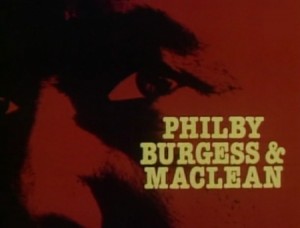

Pingback: Cedric Messina | British Television Drama
Pingback: The Falklands Factor (1983) | British Television Drama
Pingback: Disputed territory: drama and the Falklands | British Television Drama